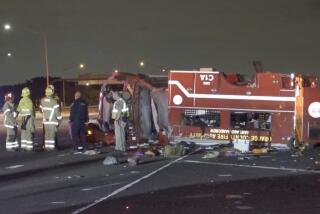Miracle Mile lunch trucks prompt a food fight
Each day around lunchtime, a caravan of food trucks converges on the Miracle Mile to help feed the neighborhood’s white-collar workforce. Depending on who you are, the phenomenon is either mouth-watering or infuriating.
For food truck lovers — and there are many in this city — Wilshire Boulevard near South Curson Avenue is a mecca, distinguished by the sheer number of upscale trucks it attracts. On Wednesday about 1 p.m., there were nearly a dozen. Across the street from the La Brea Tar Pits, the India Jones Chow Truck, Mrs. Beasley’s Dessert Truck and Fishlips Sushi were all crowded into half a block.
For restaurant owners, the trucks are competition that take away business and hog precious metered parking spaces. Some shop owners are said to have called the police on trucks that languish beyond the allowed hour at a meter.
Last Friday, Los Angeles City Councilman Tom LaBonge waded into the mounting squabble by introducing two motions that could lead to food trucks being banned on many city streets. One proposal asks city staff to study what other cities have done and to look into prohibiting trucks from parking at metered spaces in commercially zoned areas. The other calls for a report on the creation of specially designated catering-truck parking zones.
Food truck owners and patrons — famous for their fervor and their mastery of social media sites such as Twitter — have mounted a campaign against the proposals and the councilman himself.
Someone has set up a Facebook page called “Los Angelinos Against Labonge.” An online petition “against any city bill that would limit access to the food trucks” had racked up 2,000 digital signatures in just three days. Food truck supporters accosted LaBonge during his community bicycle ride Wednesday evening to complain about his proposals.
On Twitter, where the controversy became a major local topic Wednesday, one post urged food truck supporters to attend the ride to tell LaBonge “you don’t approve of his hatred of food trucks!”
Others complained that LaBonge — whose district includes the contentious stretch of the Miracle Mile — shouldn’t try to fix a local problem with a policy that would hurt food trucks citywide.
“That one stretch of Wilshire is bad. I’d be willing to say it’s egregious,” said Erin Glenn, who heads the Asociación de Loncheros, a nonprofit organization of about 300 mostly Latino-owned lunch trucks, many of which are the more traditional tacos, tortas and burger purveyors that predate the recent gourmet food truck craze. “But I don’t think that everyone else should be punished. It would stand to displace people who have been working in the same spot for years and who have a rapport with the community.”
Matt Geller, who heads the Southern California Mobile Food Vendors Assn., agreed. “It’s like using a chain saw when a scalpel is necessary,” said Geller, whose 6-month-old group lobbies on behalf of several dozen of the chic, newer food trucks.
Previous city attempts to regulate food trucks have not lasted long. Last year a court commissioner nixed an ordinance passed by the City Council in 2006 that prohibited food trucks from parking in the same spot for more than half an hour in a residential neighborhood and more than an hour in a commercial area. A similar law adopted by the Los Angeles County Board of Supervisors was tossed out by a judge in 2008.
It isn’t clear whether LaBonge, 56, has experienced the likes of wildly popular Korean-Mexican Kogi BBQ or the trucks that sell only buttery cupcakes or gourmet grilled cheese. Asked if he had sampled from a food truck, he mentioned eating from them when he was a child.
As for the Miracle Mile problem, he said it was not unique.
Speaking to journalists on Wilshire Boulevard on Wednesday, he gestured angrily at the trucks parked on the street.
“That space was not created there for that type of business,” he said. “It’s being overwhelmed by mobile trucks that come from outside and then leave.”
It spells the birth of a “mobile society,” he said, in which brick-and-mortar stores and restaurants — important linchpins in a neighborhood — end up abandoned by their now-roving former customers
“I believe in villages,” he said. “If we become such a mobile society, we lose our community.”
Dan Kim, 36, who was working the order window at Bool, his mother’s Korean-fusion truck, said he feels he is a part of the Miracle Mile community.
Wednesday afternoon, half a dozen patrons sat or stood near his truck, taking in the sun while eating dishes such as kimchi quesadillas and tofu burritos.
“People like us over here,” Kim said. “It’s free enterprise.”
If food trucks were banned from metered spaces, “it would be devastating,” Kim said. “If something like that happened, we would be pulled under.”
Restaurants near the trucks appeared to be doing brisk business, and there were available parking spots nearby.
Ted Lange, 31, who works nearby for the Style Network, had just ordered a spicy flatbread called a paratha from the India Jones Chow Truck. Asked about the controversy, he said if the trucks left, “I guess I’d be packing a lunch.”
More to Read
Sign up for Essential California
The most important California stories and recommendations in your inbox every morning.
You may occasionally receive promotional content from the Los Angeles Times.











